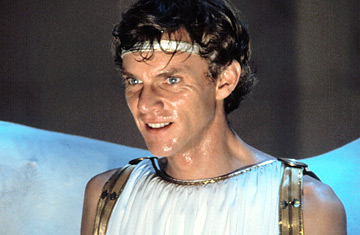
Caligula starring Malcolm McDowell
Director: Tinto Brass; Writer: Gore Vidal
With Malcolm McDowell, Teresa Ann Savoy, John Gielgud, Helen Mirren, Peter O'Toole
Imagine Entertainment
What was the HBO series Rome but Caligula without the hard-core sex? Moviemakers are drawn to the Roman Empire's decadence as a political metaphor for our own time and a license for orotund speeches and sexual excess. Caligula, filmed in 1977 and released two years later after many legal wrangles over the final cut, is remembered today as a bloated folly, a gargantuan collision of egos — Vidal's, Brass' and producer Bob Guccione's — and the most expensive pornographic film of all time ($17.5 million in the late 70s, which would be $55 million today). It also earned many millions at the international box office, (one of the participants, actor John Steiner, floats the number $200 million), which proves how much more liberated or decadent moviegoing back then than today.
The film itself, in either of the two cuts available on this "3 disc Imperial Edition," is both sumptuous and amateurish. Intended as an ultra-raunchy Fellini Satyricon, the movie looks murky, the English stars embarrassed, the sex sequences (some shot by Penthouse editor Guccione without Brass' knowledge) explicit but turgid. It's tough to sit through. But the project is fascinating as an attempt to fuse the historical epic with the porno film at a time when it seemed possible that serious cinema might go hard-core. So the extras, not the movie, are the items of value here.
In one interview, the cigar-chomping Brass, who later fashioned a career in lush soft-core erotic comedies, weighs in on the controversy, and the lawsuits. "In my own mind, the film should have been a film on the orgy of power," he says. "In their version, it became the power of the orgy." But the DVD's immortal entertainment value is in the commentaries by folks you might think couldn't have endured watching Caligula again — because they were in it. Mirren, who at the time called the movie "an irresistible mix of art and genitals," now likens it to "an acid trip that has its good moments and its bad moments, but all in all is a fantastical journey."
McDowell's track is instructive and hilarious. He recalls an early chat with Vidal, who told him: "Just think of Bob Guccione as one of the Warner brothers." McDowell didn't mind that the Roman sex slaves were in the buff, but "I kept saying to Tinto Brass, Why is the Army nude, though?'" He switches to a gruff Italian accent: "O, you want to see a lot of cock and balls." Thrilled to be working with such distinguished Brit actors, he remembers that O'Toole was flabbergasted at Gielgud's presence: "What is a knight of the realm doing in a porno movie?" (What was O'Toole doing there?) But McDowell attests that Gielgud "absolutely loved the film," and shifts into the great actor's plummy voice: "I've seen it three times. It's frightfully good. And I paid twice!" Only rarely is McDowell distracted by the movie in front of him. In mid-chat, he notices his 30-years-younger self bottomless in the film and pauses to say, "Wow. Quite an ass."
Lots of folks thought McDowell was quite an ass for lending his strutting power to Caligula. But his feature-length raconteurage is an artful, improvised history of this black mess — and a demonstration, if one more were needed, that actors can rationalize anything.